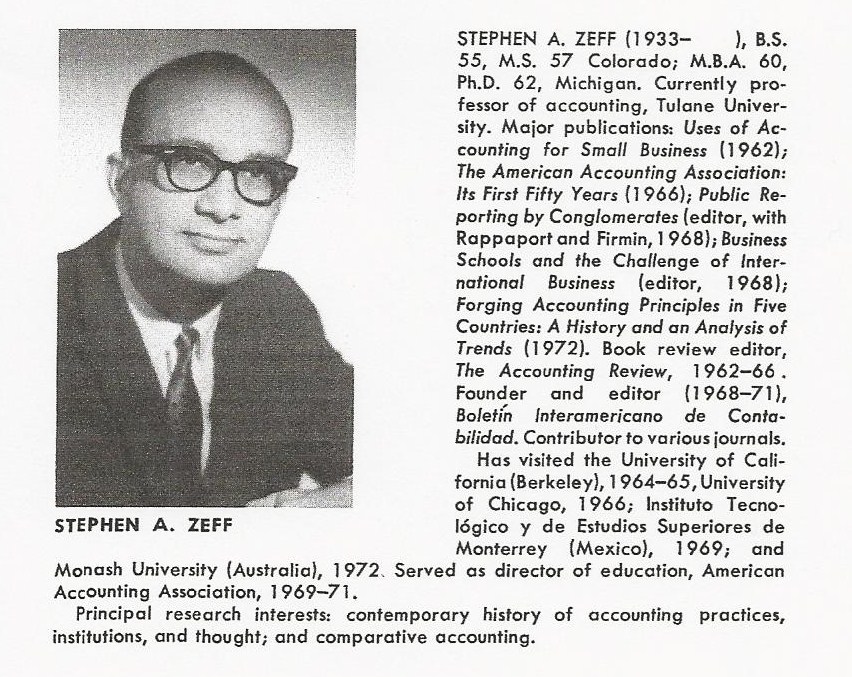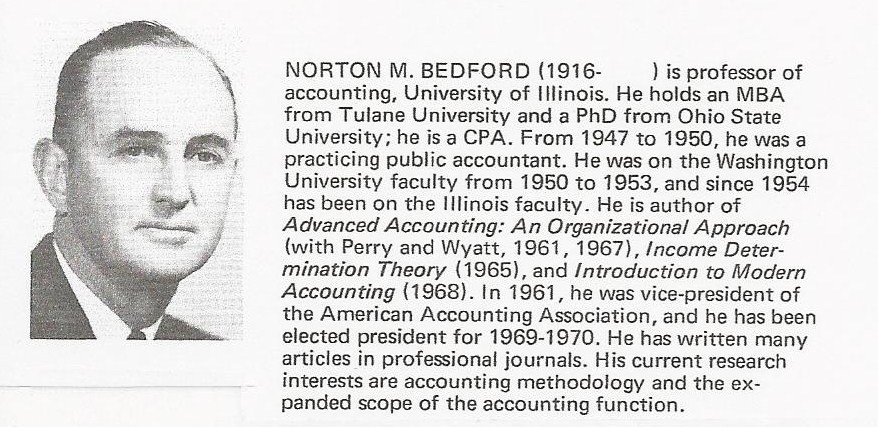
Provided by James R. Martin, Ph.D., CMA
Professor Emeritus, University of South Florida
History and Development Main Page
| Hall of Fame at AAA
Related to all or several members of the Accounting Hall of Fame
Heckert, J. B. 1950. Accounting Hall of Fame. The Accounting Review (July): 260-261.
Burns, T. J. 1975. The Accounting Hall of Fame. The Accounting Historians Journal 2(1-4): 37-39.
Burns, T. J. and E. N. Coffman. 1976. The Accounting Hall of Fame: A profile of the members. Journal of Accounting Research (Autumn): 342-347.
Burns, T. J. 1982. The Accounting Hall of Fame: Profiles of Forty-One Members. College of Administrative Science, Ohio State University.
Burns, T. J. 1987. The Accounting Hall of Fame. Journal of Accountancy (May): 393-397.
Burns, T. J. 1991. The Accounting Hall of Fame: Profiles of Fifty Members, 3rd edition. College of Business, Ohio State University.
Coffman, E. N. and T. J. Burns. 1976. The Accounting Hall of Fame: Profiles of Thirty-Six Members. College of Administrative Science.
Jensen, D. L. editor. 2002. Challenge and Achievement in Accounting During the Twentieth Century: A Conference Celebrating the Fiftieth Anniversary of the Accounting Hall of Fame. Ohio State University.
Zeff, S. A. 1987. Leaders of the accounting profession: 14 who made a difference. Journal of Accountancy (May): 46-71. (Robert H. Montgomery, George O. May, William A. Paton, Carman G. Blough, Andrew Barr, Samuel J. Broad, John L. Carey, Paul Grady, Eric L. Kohler, A. C. Littleton, Weldon Powell, Leonard Spacek, Charles E. Sprague, and William W. Werntz).
Arthur Edward Andersen (1985-1947)
Arthur Edward Andersen was a founder of the accounting firm Arthur Andersen LLP.
George David Anderson (1922-2001)
AAA 2018. "George David Anderson was a founding partner of Anderson & ZurMeuhlen Co. PC of Helena Montana. He served as President of the Montana Society of CPAs, and as Chairman of the Board (1981-82) of the American Institute of Certified Public Accountants (AICPA). He led the AICPA’s special committee on standards of professional conduct responding to developments brought about by high profile bank failures and corporate bankruptcies. This initiative secured changes to the governance and continuing review of CPA qualifications which are recognized as one of the seminal events in the history of the CPA profession."
Thomas Coleman Andrews (1899-1983)
Coffman, E. N. and D. L. Jensen. 1996. T. Coleman Andrews Collection of Writings: Thomas J. Burns Series in Accounting History Accounting Hall of Fame. OSU Acctg Hall of Fame.
Robert Newton Anthony (1916-2006)
Birnberg, J. G. 2011. Robert N. Anthony: A pioneering thinker in management accounting. Accounting Horizons (September): 593-602.
Trueblood, R. M., T. J. Burns and R. N. Anthony. 1987. 1986 Accounting Hall of Fame induction: Robert N. Anthony. The Accounting Historians Journal 14(1): 131-134.
Marshall Smith Armstrong (1914-2005)
Marshall Smith Armstrong was the first chairman of the Financial Accounting Standards Board.
George Davis Bailey (1890-1966)
George Davis Bailey was the First Executive Partner of Touche, Niven, Bailey, and Smart (a Predecessor Firm to Deloitte Touche Tohmatsu).
Richard Thomas Baker (1917-2002)
Groves, R. J., T. J. Burns and R. T. Baker. 1994. 1993 Accounting Hall of Fame induction: Richard T. Baker. The Accounting Historians Journal 21(1): 275-284.
Raymond John Ball (1944-)
https://aaahq.org/Accounting-Hall-of-Fame/members/2009/Raymond-John-Ball
Andrew Barr, Jr. (1901-1995)
Previts, G. J. and D. L. Flesher. 1996. Retrospective: Andrew Barr: Longest serving SEC Chief Accountant. The Accounting Historians Journal 23(1): 117-125.
Zeff, S. A. 1987. Leaders of the accounting profession: 14 who made a difference. Journal of Accountancy (May): 46-71. (Robert H. Montgomery, George O. May, William A. Paton, Carman G. Blough, Andrew Barr, Samuel J. Broad, John L. Carey, Paul Grady, Eric L. Kohler, A. C. Littleton, Weldon Powell, Leonard Spacek, Charles E. Sprague, and William W. Werntz).
Mary Elizabeth Barth
AAA. 2018. "Mary Elizabeth Barth is the Joan E. Horngren Professor of Accounting at Stanford University. Her contributions include serving as a member of the Accounting Standards Executive Committee of the AICPA. She was a member of the International Accounting Standards Board (IASB) from its inception in 2001 until 2009. In this role, Barth contributed significantly to the content and processes of financial reporting and standard setting. She also has served as Chair of the External Audit Committee of the International Monetary Fund and as President of the American Accounting Association (2013-14). She is currently the Senior Editor of The Accounting Review, the AAA’s premier journal, which was established in 1926."
William Threipland Baxter (1906-2006)
William T. Baxter (1906-2006). 2006. Accounting and Business Research: 135-136. Reprinted in Parker, R. H., S. A. Zeff and M. Anderson. 2012. Major Contributions To The British Accountancy Profession: A biographical sourcebook. The Institute of Charted Accountants of Scotland, p. 18-19. uk/parker
William Henry Beaver (1940-2024)
Horngren, C. T., D. L. Jensen and W. H. Beaver. 1997. Accounting Hall of Fame induction: Citation and response: William Henry Beaver. The Accounting Historians Journal 24(1): 157-164.
Norton Moore Bedford (1916-2003)
Burns, T. J. and N. M. Bedford. 1988. 1988 Accounting Hall of Fame induction: Norton Moore Bedford. The Accounting Historians Journal 15(2): 205-212.
The following biography was written by Steve Zeff and appeared in Keller, T. F. and S. A. Zeff. editors. 1969. Financial Accounting Theory II: Issues and Controversies. McGraw Hill, p. 65.

Philip W. Bell (1924-2007)
Peasnell, K. and G. Whittington. 2010. The contribution of Philip W. Bell to accounting thought. Accounting Horizons (September): 509-518.
The following biography was written by Steve Zeff and appeared in Zeff, S. A. and T. F. Keller, editors. 1973. Financial Accounting Theory I: Issues and Controversies, Second edition. McGraw Hill, p. 335.
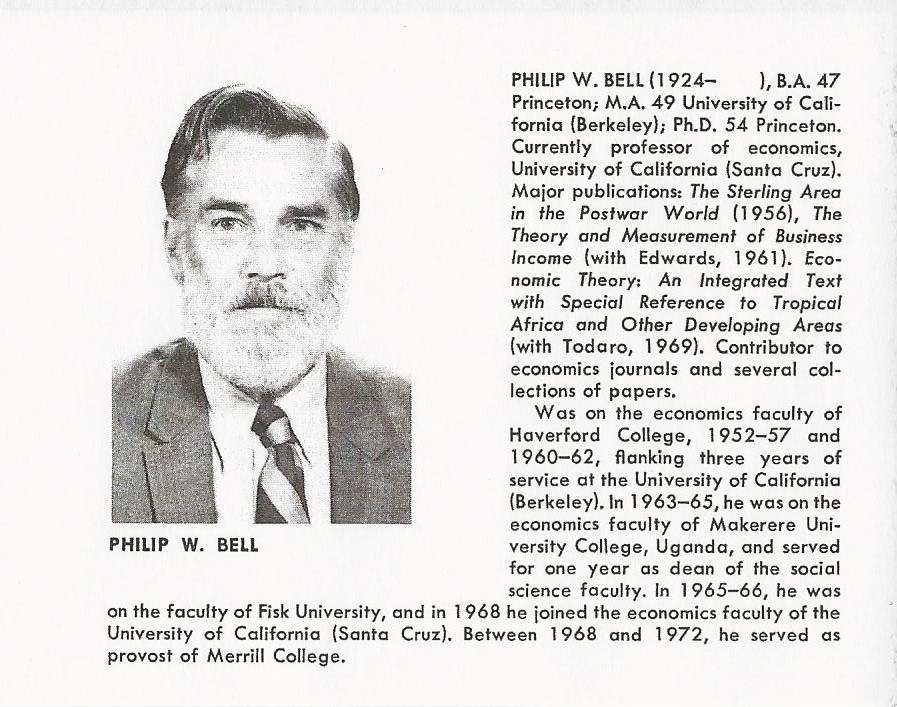
Lord Henry Alexander Benson (1909-1995)
Jenkins, B. 1995. Lord Benson 1909-1995. The Independent (March 13). Reprinted in Parker, R. H., S. A. Zeff and M. Anderson. 2012. Major Contributions To The British Accountancy Profession: A biographical sourcebook. The Institute of Charted Accountants of Scotland, p. 21. uk/parker
Dennis Robert Beresford (1938-
2005. Beresford inducted into Accounting Hall of Fame, receives AICPA Gold Medal. An article from: Catalyst. Thomson Gale.
Journal of Accountancy. 2005. Institute honors Beresford. Journal of Accountancy (January):88.
Carman George Blough (1895-1981)
Cooper, W. D. 1982. Carman G. Blough's contributions to accounting: An overview. The Accounting Historians Journal 9(2): 61-67.
Cooper, W. D. 1982. Carman G. Blough: Selected Contributions in Accounting. Georgia State University.
Moonitz, M. 1982. Memorial: Carman George Blough 1895-1981. The Accounting Review (January): 147-160.
Scott, R. A. and E. G. Ward. 1982. Carman G. Blough: His personality and formative years. The Accounting Historians Journal 9(2): 53-60.
Zeff, S. A. 1987. Leaders of the accounting profession: 14 who made a difference. Journal of Accountancy (May): 46-71. (Robert H. Montgomery, George O. May, William A. Paton, Carman G. Blough, Andrew Barr, Samuel J. Broad, John L. Carey, Paul Grady, Eric L. Kohler, A. C. Littleton, Weldon Powell, Leonard Spacek, Charles E. Sprague, and William W. Werntz).
Charles A. Bowsher (1931-2022)
Jensen, D. L., A. R. Wyatt and C. A. Bowscher. 1997. Accounting Hall of Fame induction: citation and response: Charles Arthur Bowshler. The Accounting Historians Journal 24(1): 143-148.
Abraham Jacob Briloff (1917-2013)
Victor Zinn Brink (1906-1992)
Accounting Education News, Winter 2020 Issue. Victor Zinn Brink (1906-1992) was the face of internal auditing for half a century. He played a key role in laying the foundation for the modern practice of internal auditing, and he co-founded the organization that now represents more than 200,000 internal auditors in about 200 countries worldwide. Based on his doctoral work at Columbia University of Business, Brink wrote the first major textbook on internal auditing in 1941. It is still in circulation (the latest edition of Brink’s Modern Internal Auditing was published in 2016). In addition to his service as a founder of The Institute of Internal Auditors (IIA) in 1941, Brink was 1950-1951 international president and served as chairman of the International Planning Committee, Director of Research, chairman of the Committee on Relations with Other Organizations, chairman of the International Executive Committee, among other positions. Brink, PhD, CIA, CPA, held a number of executive positions with Ford Motor Co., including as general auditor. Over his career, he authored over a dozen books on internal auditing and at least 180 articles in professional journals. In 1977, The IIA published his book-length history of the organization, titled Foundations for Unlimited Horizons: The Institute of Internal Auditors, 1941-1976. Brink was among the first recipients, posthumously, of The IIA’s American Hall of Distinguished Practitioners award in 2012 and was honored with the prestigious Bradford Cadmus Memorial Award in 1967. The IIA established the Victor Z. Brink Award for Distinguished Service, recognizing outstanding service to the internal audit profession. He taught at several schools, including the University of Nebraska, Dartmouth College, and Columbia University.
Samuel John Broad (1893-1972)
Coffman, E. N. and D. L. Jensen. 1993. Samuel J. Broad Collection of Writings: Thomas J. Burns Series in Accounting History Accounting Hall of Fame. OSU Acctg Hall of Fame.
Previts, G. J. and T. R. Robinson. 1996. Samuel J. Broad's contribution to the accounting profession. The Accounting Historians Journal 23(2): 69-85.
Zeff, S. A. 1987. Leaders of the accounting profession: 14 who made a difference. Journal of Accountancy (May): 46-71. (Robert H. Montgomery, George O. May, William A. Paton, Carman G. Blough, Andrew Barr, Samuel J. Broad, John L. Carey, Paul Grady, Eric L. Kohler, A. C. Littleton, Weldon Powell, Leonard Spacek, Charles E. Sprague, and William W. Werntz).
Frank Donaldson Brown (1885-1965)
Flesher, D. L. and G. J. Previts. 2013. Donaldson Brown (1885-1965): The power of an individual and his ideas over time. The Accounting Historians Journal 40(1): 79-101.
Percival Flack Brundage (1892-1979)
Robert Louis Bunting (1945-)
Thomas Junior Burns (1923-1996)
Jensen, D. L. 1998. Accounting Hall of Fame 1997 induction: Citation: Thomas Junior Burns. The Accounting Historians Journal 25(1): 159-161.
John C. Burton (1932-2010)
Kirk, D. J., D. L. Jensen and J. C. Burton. 1998. Accounting Hall of Fame 1997 induction: Remarks, citation, and response: John Campbell Burton. The Accounting Historians Journal 25(1): 149-158.
Sack, R. J. 2012. John C. Burton: A grain of sand in the oyster 1932-2010. Accounting Horizons (March): 147-159.
William L. Campfield (1912-1993)
Accounting Education News. 2019. 47(1): 6. "William L. Campfield worked in various capacities, including executive management, with the U.S. Government Accountability Office (GAO), where he is noted for his role in the conversion of the cost accounting system for federal government agencies, and extension of the practitioner-in-residence program, establishing teaching residencies in colleges and universities across the country. He was the first African American inducted into the Beta Alpha Psi accounting fraternity (1937), the first African American to obtain the CPA designation in North Carolina (1941), and became the first African American CPA after earning his doctorate from the University of Illinois (1951). He served as Vice President of the American Accounting Association, on the faculty of over 20 universities, and authored over 100 articles, 11 of those in The Accounting Review."
John Lansing Carey (1904-1987)
Barfitt, L. A. 2007. The Contributions of John Lansing Carey to the Profession of Accountancy, Volume 10 (Studies in the Development of Accounting Thought). JAI Press.
Zeff, S. A. 1987. Leaders of the accounting profession: 14 who made a difference. Journal of Accountancy (May): 46-71. (Robert H. Montgomery, George O. May, William A. Paton, Carman G. Blough, Andrew Barr, Samuel J. Broad, John L. Carey, Paul Grady, Eric L. Kohler, A. C. Littleton, Weldon Powell, Leonard Spacek, Charles E. Sprague, and William W. Werntz).
Arthur Hazelton Carter (1884-1965)
Accounting Education News, 2021 Winter Issue. Arthur Hazelton Carter was managing partner of Haskins & Sells (H&S, now Deloitte) from 1930 to 1947 and a leader in the public accounting profession. Carter joined the firm after World War I at the urging of his father-in-law, Elijah Watt Sells. He was called “Colonel Carter” because of his rank in World War I. Carter served as president of the New York State Society of CPAs and the National Association of Cost Accountants. He was an American Institute of Accountants (now AICPA) vice president. During the 1940s, as a Major General, he served as Chief Financial Officer of the U. S. Army. Carter is best known in accounting circles for his promotion of mandatory corporate audits and his 1933 Congressional testimony. His testimony provided one of the better quotations in the history of the accounting profession when Carter was asked by Senator Alben Barkley (later vice president), “Who audits you?” Carter calmly responded, “Our conscience.” Carter’s leadership, as later documented in SEC Accounting Series Release #81, is widely considered to have represented the spirit of the audit franchise awarded to public accountants as reflected in the initial securities law, retaining the role of the private sector in the audit function. Carter was asked by the Secretary of War to return to the Army in 1941 to become the Army’s Chief Financial Officer, where he remained through the end of 1946, even though he was still listed as managing partner of H&S. He professionalized the audits of federal auditors by allowing them to use statistical sampling and to conduct audits where the records were located, rather than having documents sent to Washington. Carter paid the bill for every expenditure made by the Army during the War. In 1946, Carter received the AICPA Gold Medal for Distinguished Service to the Profession for his “outstanding service to his country and the accounting profession.” Colonel Carter is best known for his contributions to the accounting profession in the 1930s, but Major General Carter should be equally well known for his contributions to his country in the 1940s. Even in death, Carter made a contribution to the profession. When his wife, the former Marjorie Sells, died, Carter’s estate provided funding to the American Accounting Association for the Arthur H. Carter Scholarships, which were awarded from the late 1970s through 2005. Born in 1884 in Hillsboro, Kansas, Carter died January 3, 1965.
Raymond John Chambers (1917-1999)
Al-Hogail, A. A. and G. J. Previts. 2001. Raymond J. Chambers' contributions to the development of accounting thought. The Accounting Historians Journal 28(2): 1-30.
Barton, A. D. 1982. Chambers' contributions to analytical rigour in accounting. Abacus 18(2): 119-128.
Bedford, N. M. 1982. The impact of Chambers on the scope of accounting: An analysis and extension. Abacus 18(2): 112-118.
Brown, R. S. 1982. Raymond John Chambers: A biography. Abacus 18(2): 99-105.
Dean, G. W., F. L. Clarke and R. J. Chambers. 2010. Ray Chambers and Ernest Weinwurm - Scholars in unison on measurement in accounting. The Accounting Historians Journal 37(2): 1-37.
Dean, G. W., P. W. Wolnizer and F. L. Clarke. 2006. The R. J. Chambers collection: An "archivist's" revelations of 20th century accounting thought and practice. The Accounting Historians Journal 33(1): 145-166.
Lee, T. A. 1982. Chambers and accounting communication. Abacus 18(2): 152-165.
Mathews, R. 1982. Chambers and the development of accounting theory: A personal reminiscence. Abacus 18(2): 175-178.
Moonitz, M. 1967. Chambers on the price level study. Abacus 3(1): 55-61.
Moonitz, M. 1982. Chambers at the American Institute of Certified Public Accountants. Abacus 18(2): 106-111.
Paton, W. A. 1982. Foreword. Abacus 18(2): iii-iii. (Comments related to Ray Chambers).
Poullaos, C. 1989. Chambers on Accounting: Mots against the current: Chambers on Accounting, Accounting Thought and Practice Through the Years series Volume I: Accounting Management and Finance, Volume II: Accounting Practice and Education, Volume III: Accounting Theory and Research, Volume IV: Price Variation Accounting, Volume V: Continuously Contemporary Accounting by R. J. Chambers; G. W. Dean. The Accounting Historians Journal 16(2): 246-252.
Poullaos, C. 1992. Review: Accounting Methodology and the Work of R. J. Chambers by M. J. R. Gaffikin. The Accounting Historians Journal 19(2): 182-185.
Stamp, E. 1982. R. J. Chambers: Laudatio viri veritati studentis. Abacus 18(2): 182-184.
Wells, M., D. L. Jensen and R. J. Chambers. 1991. Accounting Hall of Fame induction: Raymond J. Chambers. The Accounting Historians Journal 19(1): 79-87.
Wells, M. 1992. Founding editor of Abacus honoured. Abacus 28(1): 1.
Wolnizer, P. W. 2000. Raymond John Chambers. Abacus 36(1): 1-3.
Wolnizer, P. W. and G. W. Dean. 2000. Chambers as educator and mentor. Abacus 36(3): 243-254.
Zeff, S. A. 1982. In appreciation of Ray Chambers, an Australian original. Abacus 18(2): 179-181.
The following biography was written by Steve Zeff and appeared in Keller, T. F. and S. A. Zeff. editors. 1969. Financial Accounting Theory II: Issues and Controversies. McGraw Hill, p. 86.
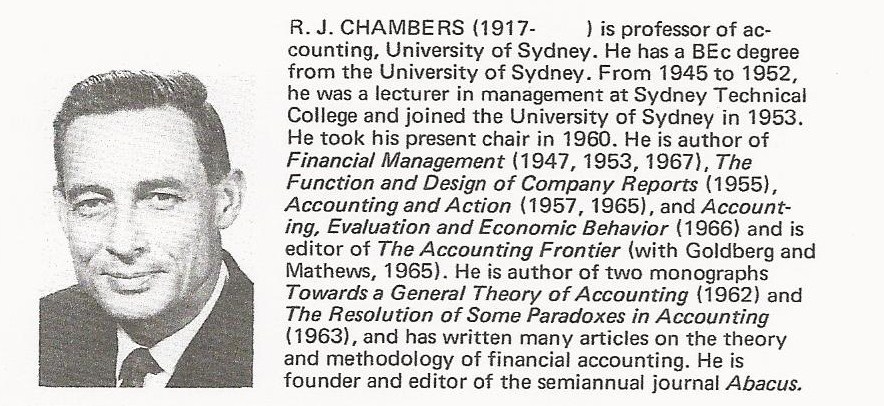
Jay Michael Cook (1942-
Gellein, O., D. L. Jensen and J. M. Cook. 2000. Accounting Hall of Fame 1999 induction: Remarks, citation, and responses: J. Michael Cook. The Accounting Historians Journal 27(1): 173-178.
William Wager Cooper (1914-2012)
Banker, R. D. and R. S. Kaplan. 2014. William W. Cooper: Innovator,
fighter, and scholar. Accounting Horizons (March): 193-203.
Burns, T. J. 1996. 1995 Accounting Hall of Fame induction: William W. Cooper. The Accounting Historians Journal 23(1): 127-129.
Ijiri, Y. and T. Sueyoshi. 2010. Accounting essays by Professor William W. Cooper: Revisiting in commemoration of his ninety-fifth birthday. Abacus 46(4): 464-505.
Sidney Davidson (1919-2007)
Journal of Accounting Research. 2008. In memorium: Sidney Davidson. Journal of Accounting Research (March): iii-iv.
Journal of Accounting Research. 2008. In memorium: Sidney Davidson. Journal of Accounting Research (May): iii-iv.
Journal of Accounting Research. 2008. In memorium: Sidney Davidson. Journal of Accounting Research (June): iii-iv.
The following biography was written by Steve Zeff and appeared in Zeff, S. A. and T. F. Keller, editors. 1973. Financial Accounting Theory I: Issues and Controversies, Second edition. McGraw Hill, p. 467.
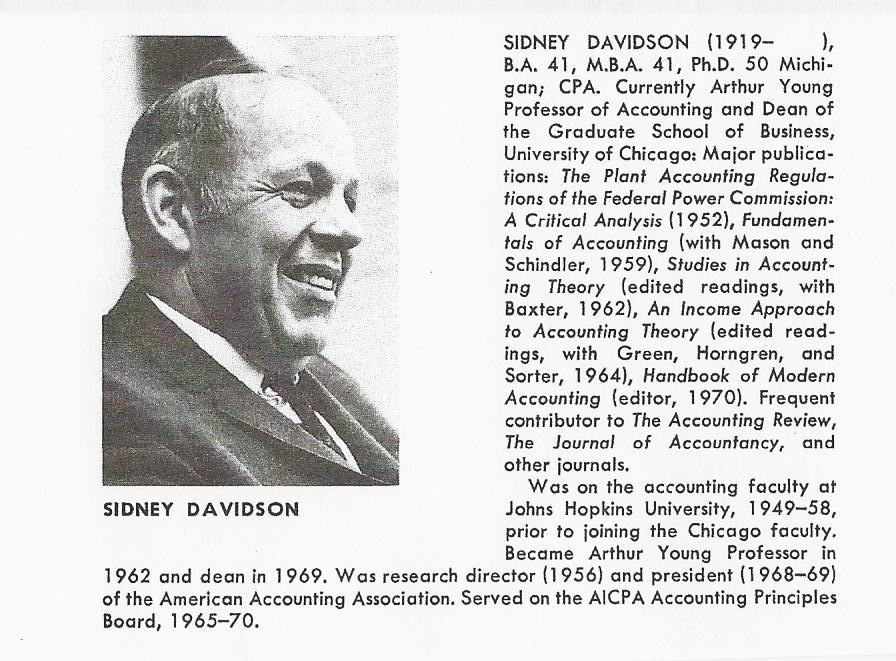
Philip Leroy Defliese (1915-1997)
Burns, T. J., R. M. Trueblood, Y. Ijiri and P. L. Defliese. 1987. 1987 Accounting Hall of Fame induction: Philip Leroy Defliese. The Accounting Historians Journal 14(2): 93-97.
Coffman, E. N. and D. L. Jensen. 1999. Philip L. Defliese Collection of Writings: Thomas J. Burns Series in Accounting History Accounting Hall of Fame. OSU Acctg Hall of Fame.
Joel Stanley Demski (1940-
Horngren, C. T., D. L. Jensen and J. S. Demski. 2001. Accounting Hall of Fame 2000 induction: Remarks, citation, and response: Joel S. Demski. The Accounting Historians Journal 28(1): 131-136.
Sir Arthur Lowes Dickinson (1859-1935)
Nicholas Dopuch (1929-2018)
Moehrle, S. R., M. E. Persson and J. A. Reynolds-Moehrle. 2022. Nicholas Dopuch (1929-2018): Editor, mentor, and harbinger of a quantitative accounting research revolution. Accounting Horizons (June): 167-177.
AAA note on induction. Kinney, W. and R. Libby. 1999. Research on credible financial reporting 1961-99: The contributions of Professor Nicholas Dopuch. Journal of Accounting Research (Studies on Credible Financial Reporting): 1-15.
The following biography was written by Steve Zeff and appeared in Keller, T. F. and S. A. Zeff. editors. 1969. Financial Accounting Theory II: Issues and Controversies. McGraw Hill, p. 65.
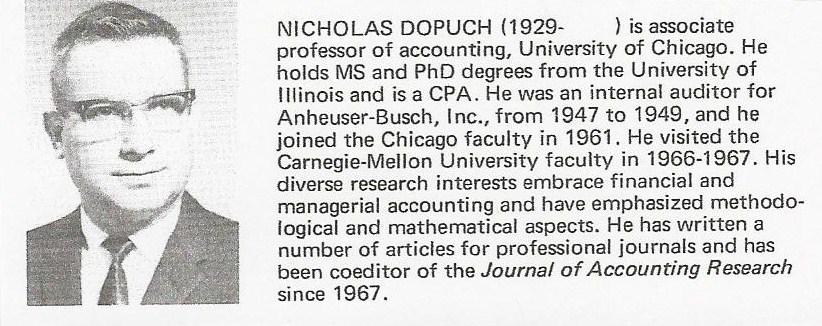
Thomas Dyckman (1932-
Marquis George Eaton (1898-1958)
Coffman, E. N. and D. L. Jensen. 2000. Marquis G. Eaton Collection of Writings: Thomas J. Burns Series in Accounting History (Accounting Hall of Fame). Ohio State University.
Edgar O. Edwards (1919-2010)
Zeff, S. A. 2012. Edgar Owen Edwards 1919-2010. Accounting Education News (Summer): 13.
The following biography was written by Steve Zeff and appeared in Zeff, S. A. and T. F. Keller, editors. 1973. Financial Accounting Theory I: Issues and Controversies, Second edition. McGraw Hill, p. 319.
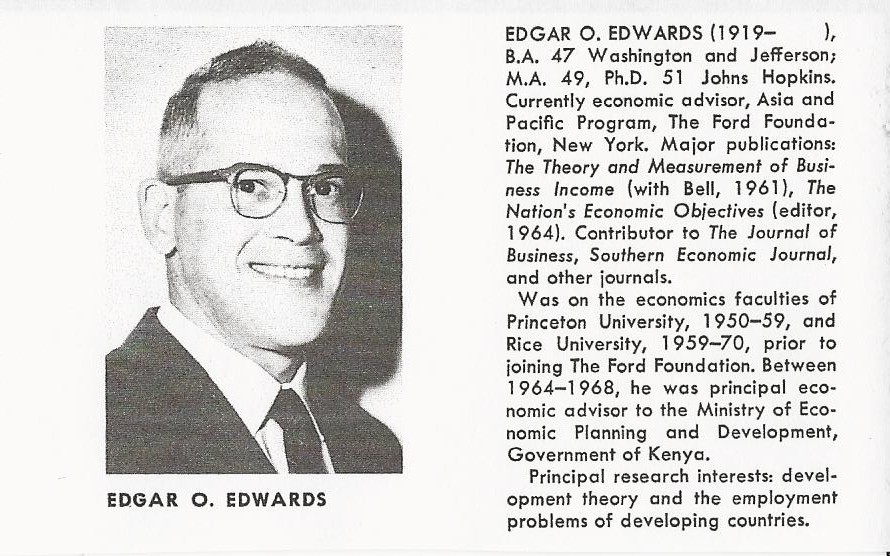
James Don Edwards (1926-2020)
James Don Edwards, the J.M. Tull Professor Emeritus of Accounting at the University of Georgia, died November 21, 2020, in Athens, Georgia. https://aaahq.org/Outreach/In-Memoriam#JDEdwards
Robert Kalb Elliott (1941-2022)
Gerald Albert Feltham (1938-2019)
Shields, M. D. 2005. Introductory note: Jerry Feltham: Management accounting revolutionary. Journal of Management Accounting Research (16): 143.
Simunic, D. A. 2020. Eulogy Gerald A. (Jerry) Feltham. Contemporary Accounting Research 37(2): 641.
Harry Anson Finney (1886-1966)
Arthur Bevins Foye (1893-1976)
Oscar Strand Gellein (1911-?)
Paul Franklin Grady (1900-1984)
Andrews, W. T. Jr. 1995. Retrospective: Paul Franklin Grady. The Accounting Historians Journal 22(1): 149-158.
Zeff, S. A. 1987. Leaders of the accounting profession: 14 who made a difference. Journal of Accountancy (May): 46-71. (Robert H. Montgomery, George O. May, William A. Paton, Carman G. Blough, Andrew Barr, Samuel J. Broad, John L. Carey, Paul Grady, Eric L. Kohler, A. C. Littleton, Weldon Powell, Leonard Spacek, Charles E. Sprague, and William W. Werntz).
Ray John Groves (1935-2023)
Beresford, D. R., D. L. Jensen and Ray J. Groves. 2000. Accounting Hall of Fame 1999 induction: Remarks, citation, and responses: Ray J. Groves. The Accounting Historians Journal 27(1): 179-185.
Charles Waldo Haskins (1852-1903)
Sterrett, J. E. 1923. Charles Waldo Haskins, A Biography. Journal of Accountancy (May): 394.
Cook, J. M. and D. L. Jensen. 2001. Accounting Hall of Fame 2000 induction: Remarks, citation, and response: Charles W. Haskins. The Accounting Historians Journal 28(1): 137-139.
Henry Rand Hatfield (1866-1945)
Mumford, M. J. 1980. An historical defence of Henry Rand Hatfield. Abacus 16(2): 151-157.
The Accounting Historians Journal. 1977. In tribute to H. R. Hatfield. The Accounting Historians Journal 4(1): 1.
Edwards, J. R., editor. 1994. Twentieth-Century Accounting Thinkers. Cengage Learning EMEA.
Zeff, S. A. 2000. Henry Rand Hatfield: Humanist, Scholar and Accounting Educator. JAI Press. Review by R. P. Brief. The Accounting Review (July): 461-462.
The following biography was written by Steve Zeff and appeared in Zeff, S. A. and T. F. Keller, editors. 1973. Financial Accounting Theory I: Issues and Controversies, Second edition. McGraw Hill, p. 502.
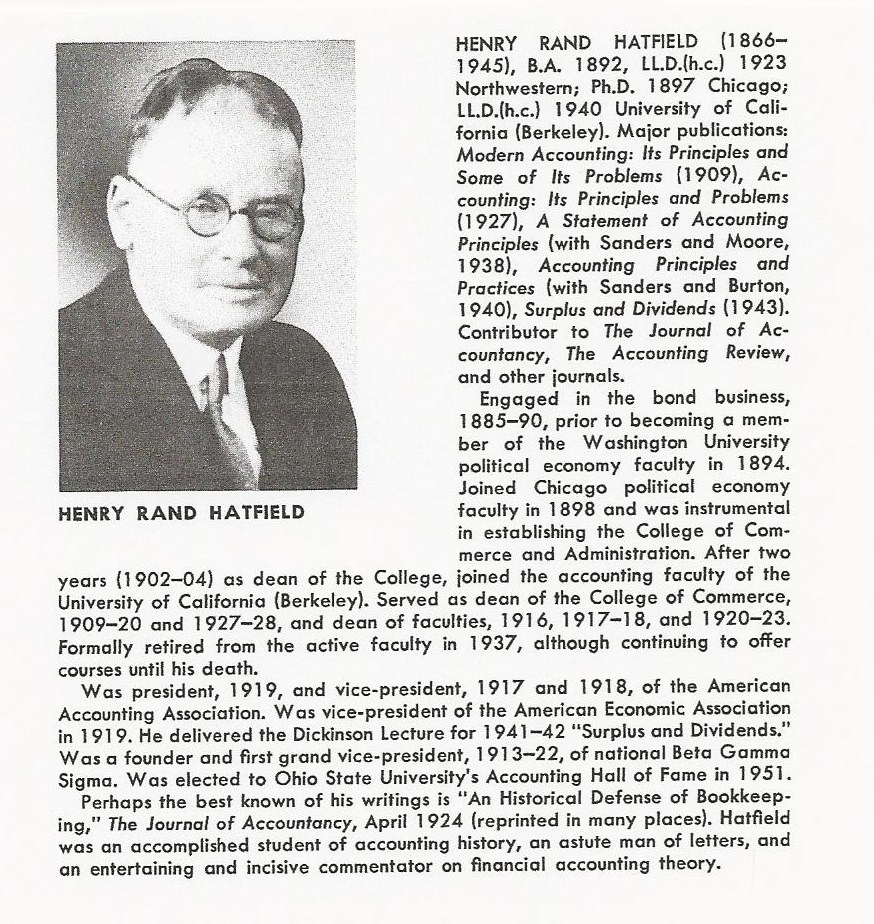
Robert H. Herz (1953-
Accounting Hall of Fame: Robert Herz inducted. 2013. Accounting Education News (Winter): 14. Herz served two terms as Chair of the FASB from 2002-2010, was a senior partner at PricewaterhouseCoopers, served as a part-time member of the International Accounting Standards Board, and authored numerous publications. He was also a coauthor of the following book. Eccles, R. G., R. H. Herz, E. M. Keegan and D. M. H. Phillips. 2001. The Value Reporting Revolution: Moving Beyond the Earnings Game. Wiley.
Anthony G. Hopwood (1944-2010)
Accounting, Organizations and Society. 2010. Anthony G. Hopwood, 1944-2010. Accounting, Organizations and Society 35(4): 496-497.
Birnberg, J. G., M. Bromwich and J. Roberts. 2013. Anthony G. Hopwood: Academic iconoclast and entrepreneur 1944-2010. Accounting Horizons (December): 895-907.
Miller, P. 2011. Anthony G. Hopwood (1944-2010). British Accounting Review 42(4): 225-226. Reprinted in Parker, R. H., S. A. Zeff and M. Anderson. 2012. Major Contributions To The British Accountancy Profession: A biographical sourcebook. The Institute of Charted Accountants of Scotland, 68-69. uk/parker
Charles Thomas Horngren (1926-2011)
Beaver, W. H. and M. A. Wolfson. 2013. Charles T. Horngren: Mentor, role model, colleague, and friend. Accounting Horizons (June): 433-442. (Link to Beaver and Wolfson).
Davidson, S., T. J. Burns and C. T. Horngren. 1990. 1990: Accounting Hall of Fame induction: Charles Thomas Horngren. The Accounting Historians Journal 17(2): 125-134.
Williams, K. 1986. Charles T. Horngren: Management accounting's renaissance man. Management Accounting (January): 22-29. "The study of management accounting is the study of management and accounting."
Zeff, S. A. 2012. Charles Thomas Horngen 1926-2011. Accounting Education News (Winter): 13.
The following biography was written by Steve Zeff and appeared in Keller, T. F. and S. A. Zeff. editors. 1969. Financial Accounting Theory II: Issues and Controversies. McGraw Hill, p. 239.
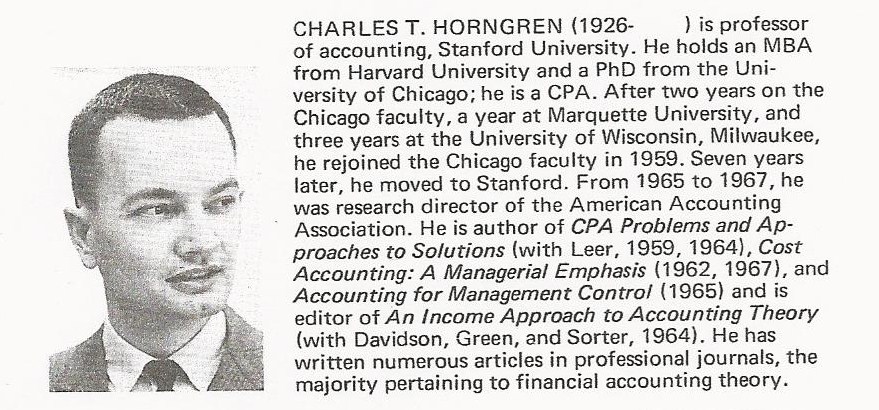
Yuji Ijiri (1935-2017)
In Memoriam: Yuji Ijiri. 2017. Accounting Education News. American Accounting Association (Winter): 23. Yuji Ijiri (1935-2017), former Trueblood University Professor of Accounting and Economics at Carnegie Mellon University died on January 18, 2017. He is considered one of the intellectual giants of his era.
Wall Street Journal. 2017. Yiji Ijiri 1935-2017. He was the only four-time winner of the American Accounting Association's Notable Contributions Award. Dr. Ijiri died January 18th. (January 28/29).
Cooper, W. W., T. J. Burns, Y. Ijiri and R. M. Trueblood. 1989. 1989 Accounting Hall of Fame induction: Yuji Ijiri. The Accounting Historians Journal 16(2): 207-214.
Edmund Lowell Jenkins (1935-2020)
Robert Samuel Kaplan (1940-
Roy Bernard Kester (1882-1965)
Donald James Kirk (?-
Kolton, P., D. L. Jensen and D. J. Kirk. 1997. Accounting Hall of Fame induction: Remarks, citation and response: Donald James Kirk. The Accounting Historians Journal 24(1): 149-156.
Olivia Faulkner Kirtley (?-
AAA 2018. "Olivia Faulkner Kirtley served as the Chief Financial Officer and Vice President of Vermont American Corporation from 1991 to 2000. Her corporate board activity includes U.S. Bancorp, Papa John's International, and Rescare, Inc. among others. She is a graduate of Florida Southern College and earned a master’s degree from Georgia State University. She served as Chair of the Board of the AICPA (1998-99) and subsequently as Chair of the Board of CPA Examiners, where she was influential in transforming the examination process to a computer based activity. Since 2009, she has been a Participant/Member of the Bank Governance Leadership Network based in London and New York. From 2014-16 Mrs. Kirtley served as Board Chair of the International Federation of Accountants (IFAC)."
Eric Louis Kohler (1892-1976)
Cooper, W. W. and Y. Ijiri. 1979. Eric Louis Kohler: Accounting's Man of Principles. Reston.
Mautz, R. K. and G. J. Previts. 1977. Eric Kohler: An accounting original. The Accounting Review (April): 300-307.
Wager, N. A. 1987. Eric Louis Kohler in the Accounting Profession. Georgia State University.
Zeff, S. A. 1987. Leaders of the accounting profession: 14 who made a difference. Journal of Accountancy (May): 46-71. (Robert H. Montgomery, George O. May, William A. Paton, Carman G. Blough, Andrew Barr, Samuel J. Broad, John L. Carey, Paul Grady, Eric L. Kohler, A. C. Littleton, Weldon Powell, Leonard Spacek, Charles E. Sprague, and William W. Werntz).
David Francis Larcker (?-
Accounting Education News, 2021 Winter Issue. David Francis Larcker is the James Irvin Miller Professor of Accounting, Emeritus, at Stanford Graduate School of Business, Faculty Director of the school’s Corporate Governance Research Initiative, and a Senior Faculty of the Arthur and Toni Rembe Rock Center for Corporate Governance. He received a Bachelor of Mechanical Engineering and a Master of Engineering Management from Missouri University of Science and Technology (Missouri S&T) in 1972 and 1974, respectively. He went on to complete a Ph.D. in Accounting at The University of Kansas in 1978. Upon graduation, he began his academic career as an Assistant Professor at the Kellogg School of Management, Northwestern University. At Kellogg, Larcker quickly rose to a full professorship in 1984, just six years since graduating from his doctoral studies. His tenure at Northwestern was followed by appointments to the Ernst & Young Professorship of Accounting at the Wharton School, University of Pennsylvania, and, later, to his current position at Stanford University in 2005. Known as a pioneer in the empirical literature on incentive problems and compensation contracts, Larcker’s research interests are broad and span from topics in executive compensation, corporate governance, and managerial accounting to methodological issues in applied econometrics. These research interests have found an expression in over 70 peer-reviewed articles published in premier accounting, finance, economics journals, over 75 thought pieces for the Rock Center for Corporate Governance at Stanford, and three books. His contributions have been cited over 100,000 times and have become cornerstones of research in their respective areas. In addition to his prodigious research output, he has given generously of his time to the accounting discipline and its institution. He has co-authored over 40 manuscripts with doctoral students and young researchers—several of whom have become prominent academics themselves—and he has served on the American Accounting Association’s Doctoral Consortium for almost a decade. He has also served as the AAA’s Distinguished Visiting International Lecturer, a member on the Financial Accounting Standards Board (FASB) committees considering executive stock options and valuation methods, and as an editorial board member of some of our most distinguished journals, such as Accounting, Organizations and Society, The Accounting Review, Journal of Accounting and Economics, Journal of Accounting Research, and Journal of Accounting and Public Policy.
James J. Leisenring (1940-
Ananias Charles Littleton (1886-1974)
Bedford, N. M. and R. E. Ziegler. 1975. The contributions of A. C. Littleton to accounting thought and practice. The Accounting Review (July): 434-443.
Buckner, K. C. 1975. Littleton's Contribution to the Theory of Accountancy. Georgia State University.
Zeff, S. A. 1987. Leaders of the accounting profession: 14 who made a difference. Journal of Accountancy (May): 46-71. (Robert H. Montgomery, George O. May, William A. Paton, Carman G. Blough, Andrew Barr, Samuel J. Broad, John L. Carey, Paul Grady, Eric L. Kohler, A. C. Littleton, Weldon Powell, Leonard Spacek, Charles E. Sprague, and William W. Werntz).
William Mitchell Lybrand (1867-1960)
Perry Empey Mason (1899-1964)
Bryson, R. E. Jr. 1975. Perry Mason (1899-1964). The Accounting Historians Journal 2(1-4): 64-67.
Robert Kuhn Mautz (1915-2002)
George Oliver May (1875-1961)
Flesher, D. L. and G. J. Previts. 2014. Preparing an accounting professional: The articles of clerkship (1892-1897) of George Oliver May. The Accounting Historians Journal 41(1): 61-78.
Paton, W. A. 1981. Recalling George Oliver May and me. The Accounting Historians Journal 8(2): 91-95.
Stabler, H. F. 1968. George O. May: A Study of Selected Contribution to Accounting Thought. Georgia State University.
Stabler, H. F. and N. X. Dressel. 1981. May and Paton: Two giants revisited. The Accounting Historians Journal 8(2): 79-90.
Zeff, S. A. 1987. Leaders of the accounting profession: 14 who made a difference. Journal of Accountancy (May): 46-71. (Robert H. Montgomery, George O. May, William A. Paton, Carman G. Blough, Andrew Barr, Samuel J. Broad, John L. Carey, Paul Grady, Eric L. Kohler, A. C. Littleton, Weldon Powell, Leonard Spacek, Charles E. Sprague, and William W. Werntz).
The following biography was written by Steve Zeff and appeared in Zeff, S. A. and T. F. Keller, editors. 1973. Financial Accounting Theory I: Issues and Controversies, Second edition. McGraw Hill, p. 382.
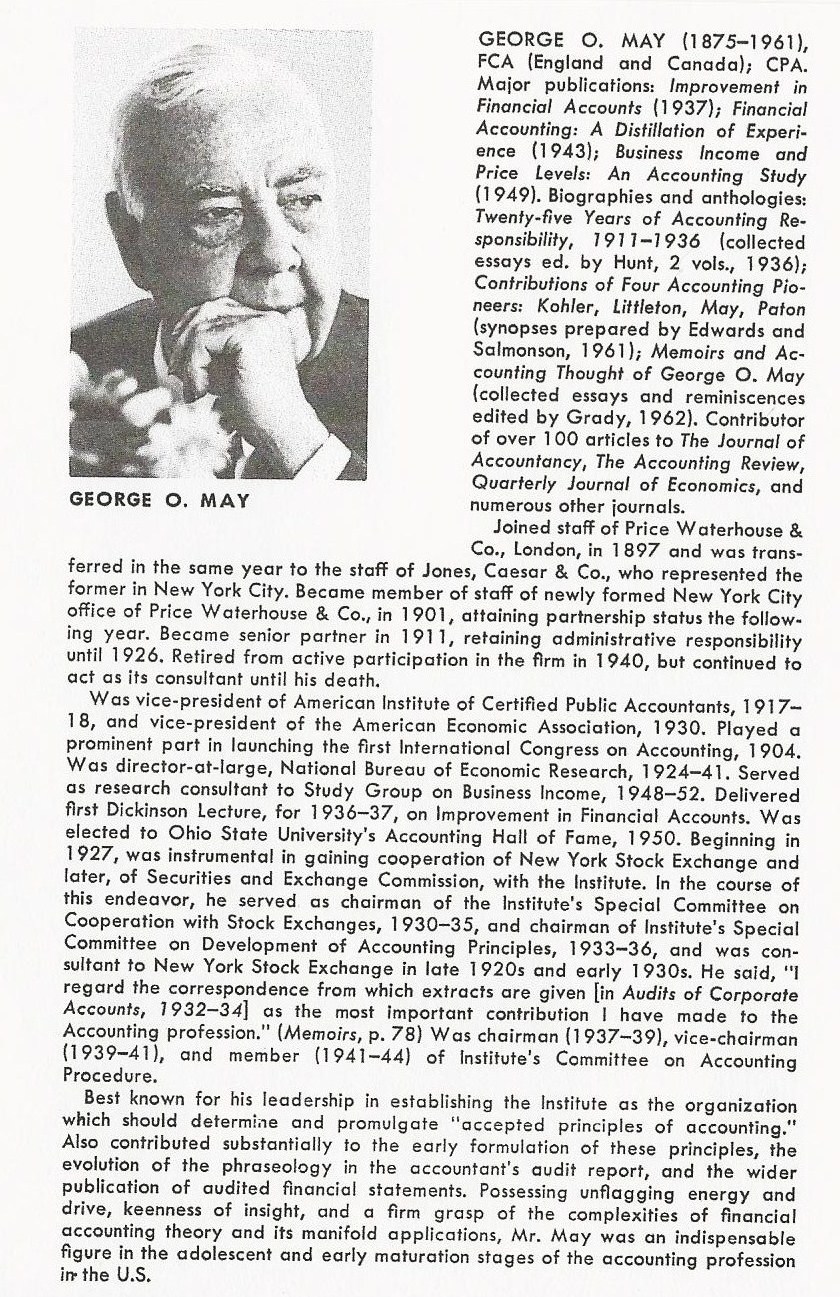
Robert Mednick (?-
Accounting Education News, Winter 2020 Issue. Robert Mednick has made important contributions to the accounting profession both in the U.S. and abroad. He was a key figure in tort reform initiatives, convergence to a single set of accounting and auditing standards, and the expansion of the audit function to broader assurance services. Mednick has written and spoken extensively about the role and future of accounting and accountants in a changing world, which have raised awareness about the responsibilities, ethics, and social and developmental role of accountants. He was worldwide managing partner of Professional and Regulatory Matters at Arthur Andersen/Andersen Consulting (now Accenture) for more than five years before retiring in mid-1998. He was also chairman of the American Institute of Certified Public Accountants (AICPA) in 1996-1997, having previously served on its Auditing Standards Board, the Financial Accounting Standards Advisory Council, and the SEC Practice Section Executive Committee. Other board service included the Rand Corporation Institute for Civil Justice and the Ray Garrett Jr. Corporate and Securities Law Institute at Northwestern University Law School. Since retirement, Mednick has served as a senior consultant to The World Bank, the founding chairman of a Compliance Advisory Panel at the International Federation of Accountants, a member of the Board and Executive Committee of the National Bureau of Economic Research in Cambridge, MA, and a member of three advisory groups to the Government Accountability Office (GAO) in Washington, DC. In 2010, the International Federation of Accountants (IFAC) honored Mednick with its lifetime achievement award (the IFAC Global Leadership Award in Honor of Robert Sempier), which is awarded to only one person worldwide once every four years. He is the only person to hold that award and the AICPA Gold Medal of Distinction, the AICPA’s highest recognition for lifetime contributions to the profession.
Herbert Elmer Miller (1914-2012)
The following biography was written by Steve Zeff and appeared in Zeff, S. A. and T. F. Keller, editors. 1973. Financial Accounting Theory I: Issues and Controversies, Second edition. McGraw Hill, p. 346.
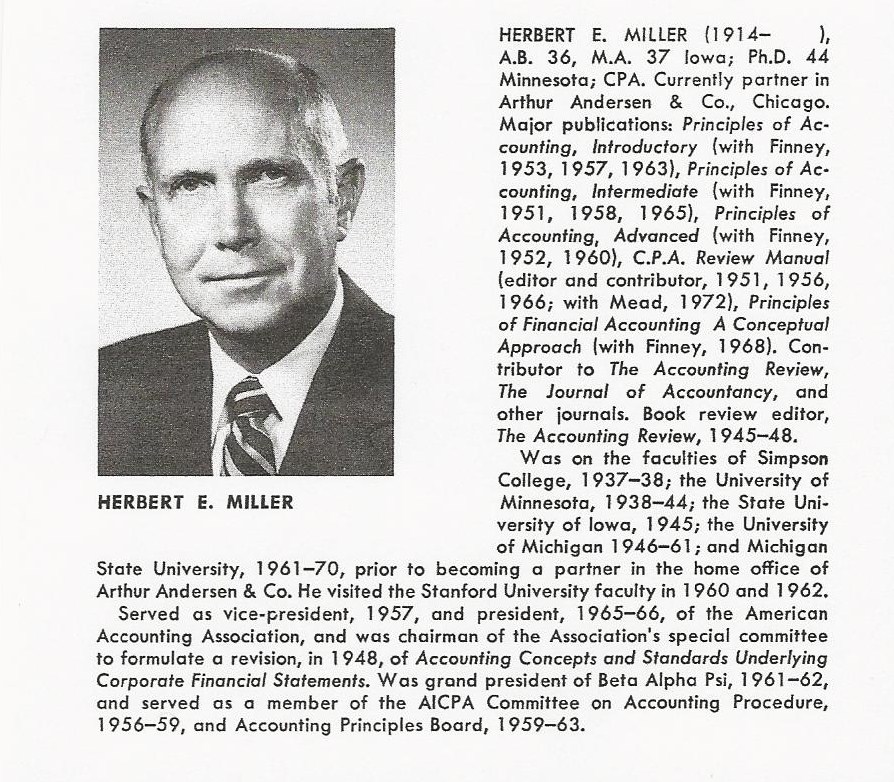
Hermann Clinton Miller (1895-1955)
Sybil Collins Mobley (1925-2015)
Accounting Education News, 2021 Winter Issue. Sybil Collins Mobley, the daughter of Melvin and Cora Collins, was born on October 14, 1925, in Shreveport, Louisiana. Both her mother and father were educators. Mobley graduated from Bishop College, Texas, with a BA in Sociology in 1945. She later earned an MBA from the Wharton School of Finance at the University of Pennsylvania in 1961. Her graduate studies continued at the University of Illinois at Urbana–Champaign where she completed a Ph.D. in Accountancy in 1964. Under Robert K. Mautz’s supervision, she completed her doctoral studies in less than two years, a university record sustained to the present day. Mobley spent her entire professional career at Florida Agricultural and Mechanical University (FAMU), the nation’s third largest historically black university. She began her career at FAMU in 1945 and rose to professor and later department chair after completing her graduate degrees. In 1974, Mobley became the founding Dean of the School of Business and Industry, a position she retained until her retirement in 2003. As Dean, she was a visionary that transformed the lives of thousands of individuals, including students, faculty, and staff. She made accounting central to the school’s mission, implemented a now world-renowned professional development program in leadership, and raised millions for scholarships for promising but underserved students in financial need. In addition to her activities as Dean, Mobley served as a consultant to the United States Agency for International Development (USAID), the Comptroller General, and as a member of several corporate boards. She also served as an active member of the International Association of Black Business Educators, National Association of Black Accountants, and Alpha Kappa Alpha. She is the recipient of numerous awards and honorary degrees from Hamilton College and the Universities of Pennsylvania, Princeton, and Washington in St. Louis. The building that hosts the business school she helped found now bears her name, and a million-dollar donation established the Mobley Hershey Endowed Chair in her honor. She married James Otis Mobley and had three children: James, Janet, and Melvin. Both she and Otis were pioneers in the Tallahassee Civil Rights movement. Mobley died at Tallahassee Memorial HealthCare in the early morning hours of September 29, 2015, after a brief illness. She was 89 years old.
Robert Hiester Montgomery (1872-1953)
Miranti, P. J. Jr. 1986. Robert H. Montgomery - A leader of the profession. The CPA Journal (August): 106.
Krzystofik, A. T. 1975. Robert Hiester Montgomery (1872-1953). The Accounting Historians Journal 2(1-4): 67-70.
Zeff, S. A. 1987. Leaders of the accounting profession: 14 who made a difference. Journal of Accountancy (May): 46-71. (Robert H. Montgomery, George O. May, William A. Paton, Carman G. Blough, Andrew Barr, Samuel J. Broad, John L. Carey, Paul Grady, Eric L. Kohler, A. C. Littleton, Weldon Powell, Leonard Spacek, Charles E. Sprague, and William W. Werntz).
Maurice Moonitz (1910-2009)
Chatfield, M. 1992. Review: Selected Writing by Maurice Moonitz. The Accounting Historians Journal 19(2): 189-191.
Zeff, S. A. 2009. Maurice Moonitz. Accounting Education News (Fall): 23.
Staubus, G. J. 2010. Maurice Moonitz: The consummate professional. Accounting Horizons (December): 703-712.
The following biography was written by Steve Zeff and appeared in Zeff, S. A. and T. F. Keller, editors. 1973. Financial Accounting Theory I: Issues and Controversies, Second edition. McGraw Hill, p. 263.
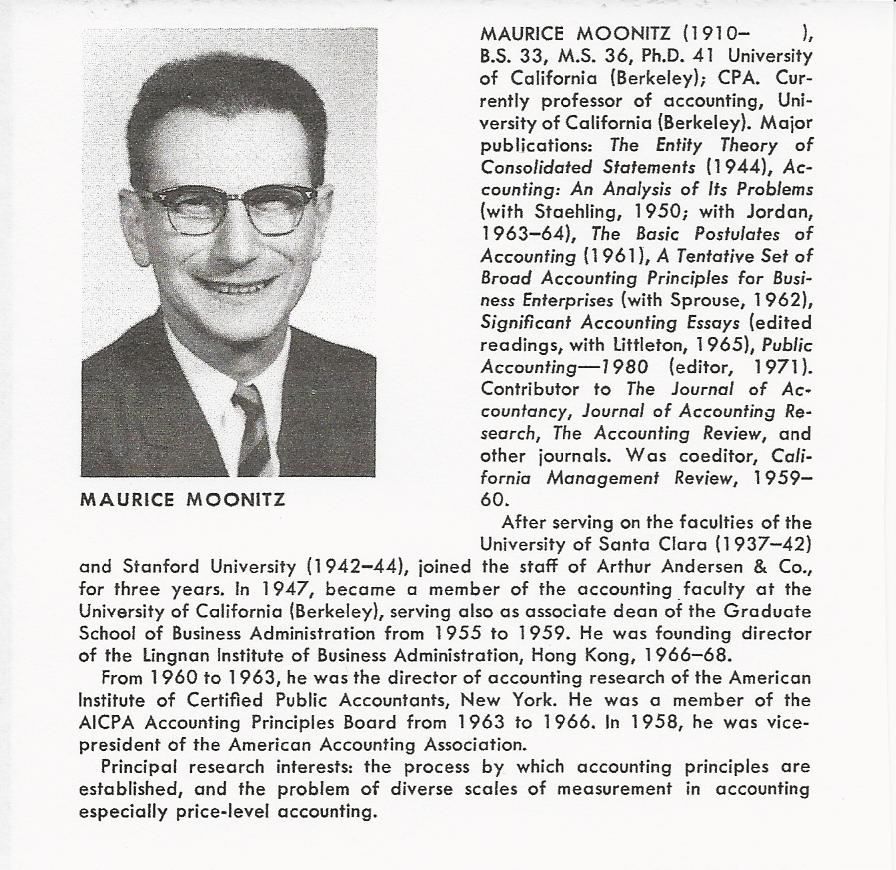
Lloyd Morey (1886-1965)
Major J. Lee Nicholson (1863-1924)
Accounting Education News. 2019. 47(1): 6. "Major J. Lee Nicholson was an industrial consultant, author, and educator at New York University and Columbia University, and is known as a pioneer in cost accounting. He is considered in the United States to be the “father of cost accounting.” The History of Accounting: An International Encyclopedia notes that Nicholson was a synthesizer: “His main contribution was to organize, improve, and propagate this new knowledge as it spread from a tiny minority of pioneering firms to the vast majority of manufacturers who still had no formal cost accounting systems at the beginning of the twentieth century” (Chatfield, 2014). As one of the earliest American cost accountants to teach the subject at the university level, he helped standardize practice and facilitated the interaction of ideas between academics and practitioners. He helped establish the National Association of Cost Accountants (NACA) in 1919, and was its first president. NACA was the forerunner of the Institute of Management Accountants (IMA), who celebrate their 100-year anniversary this year."
Charles Howard Noski (1952-)
Accounting Education News, 2021 Winter Issue. Charles Howard Noski, born August 23, 1952, in Eureka, California, was elected Chairman of the Board of Directors of Wells Fargo & Company in March 2020. He is a retired vice chairman and chief financial officer of Bank of America Corporation. He was chief financial officer of Northrop Grumman Corporation from 2003 until 2005 and a member of Northrop Grumman’s board of directors. Noski was chief financial officer of AT&T Corporation from 1999 until 2002 and vice chairman of the board of directors during 2002. From 1990 until 1999, he served in senior leadership positions with Hughes Electronics Corporation, including chief financial officer, president and chief operating officer, and a member of the board of directors. Noski began his accounting career as a staff accountant at Haskins & Sells (now Deloitte) in 1973 and rose to partner with Deloitte & Touche, where he served some of the firm’s largest and most complex clients. Noski is lead independent director of Booking Holdings Inc., and a director and member of the finance and investment committee of Hewlett Packard Enterprise Company. He previously served as a director and chairman of the audit committee of Microsoft Corporation, Morgan Stanley, Avon Products, Inc., Booking Holdings Inc., and Wells Fargo, and as chairman of the Board of Trustees of the Financial Accounting Foundation (2016-2019), chairman of the Financial Accounting Standards Advisory Council, and a member of the Standing Advisory Group of the Public Company Accounting Oversight Board. Noski is a member of the American Institute of Certified Public Accountants (AICPA), Financial Executives International (FEI), and the Audit Committee Leadership Network - North America, and served as an inaugural member of the Ernst & Young Independent Audit Quality Committee (2019-2020). He was inducted into the inaugural class of the FEI Hall of Fame in 2006. Noski earned a Bachelor of Science in Business Administration and a Master of Science in Accountancy from California State University, Northridge. A long-time supporter of accounting education, he received the school’s distinguished alumnus award in 2002, and an honorary doctorate in 2007. He and his wife Lisa have endowed the Noski Family scholarships for accounting students at Northridge. Noski’s impact includes his public service at the Financial Accounting Foundation and his deep and far-reaching experience across multiple facets of the accounting profession. From his role as Chairman of the Board of Wells Fargo, to serving as chief financial officer for some of the world’s preeminent organizations, to his early days as an auditor, he has led from the front on numerous accounting issues for nearly 50 years and served as a model and mentor to many.
James Arvid Ohlson (1943-
The Accounting Hall of Fame inducts James A. Ohlson. 2015. Accounting Education News (Fall): 19.
Shaun Fenton O'Malley (1935-
Brown, R. L., D. L. Jensen and S. F. O'Malley. 2001. Accounting Hall of Fame 2000 induction: Remarks, citation, and response: Shaun F. O'Malley. The Accounting Historians Journal 28(1): 140-145.
Zoe-Vonna Palmrose (?-
Accounting Education News. 2019. 47(1): 6. "Zoe-Vonna Palmrose is Professor Emeritus of Accounting at the University of Southern California, and is recognized as an expert in translating the complexities and jargon of accounting into plain English for general audiences. She has published and spoken extensively on financial reporting and auditing, including restatements, materiality audit litigation, and pricing of audit services. She has received numerous awards including the AAA’s Competitive Manuscript Award, the California Society of CPAs’ Accounting Faculty Fellow Award, and the Deloitte Foundation Wildman Medal Award on two occasions. From 2006 to 2008, she served as Deputy Chief Accountant for Professional Practice in the Office of the Chief Accountant at the U.S. Securities and Exchange Commission (SEC). Treasury and Risk Magazine named her one of the 100 most influential people in finance in 2008 for being instrumental in breaking the SEC code on internal controls regulation by drafting much-needed guidance, ensuring that companies can have manageable but effective controls."
Willam A. Paton (1889-1991)
Stabler, H. F. and N. X. Dressel. 1981. May and Paton: Two giants revisited. The Accounting Historians Journal 8(2): 79-90.
Taggart, H. F., N. M. Bedford, R. J. Chambers, S. Davidson, C. T. Devine, T. R. Dyckman, Y. Ijiri; T. F. Keller and R. G. Nichols. 1992. A tribute to William A. Paton. The Accounting Review (January): 1, 3-16.
Demski, J. S., S. A. Zeff, N. Dopuch and W. A. Paton, editors. 1979. Essays in Honor of William A. Paton, Pioneer Accounting Theorist. University of Michigan. Includes Zeff's essay "Paton on the effects of changing prices on accounting, 1916-1955".
Edwards, J. R., editor. 1994. Twentieth-Century Accounting Thinkers. Cengage Learning EMEA.
Zeff, S. A. 1987. Leaders of the accounting profession: 14 who made a difference. Journal of Accountancy (May): 46-71. (Robert H. Montgomery, George O. May, William A. Paton, Carman G. Blough, Andrew Barr, Samuel J. Broad, John L. Carey, Paul Grady, Eric L. Kohler, A. C. Littleton, Weldon Powell, Leonard Spacek, Charles E. Sprague, and William W. Werntz).
The following biography was written by Steve Zeff and appeared in Zeff, S. A. and T. F. Keller, editors. 1973. Financial Accounting Theory I: Issues and Controversies, Second edition. McGraw Hill, p. 389.
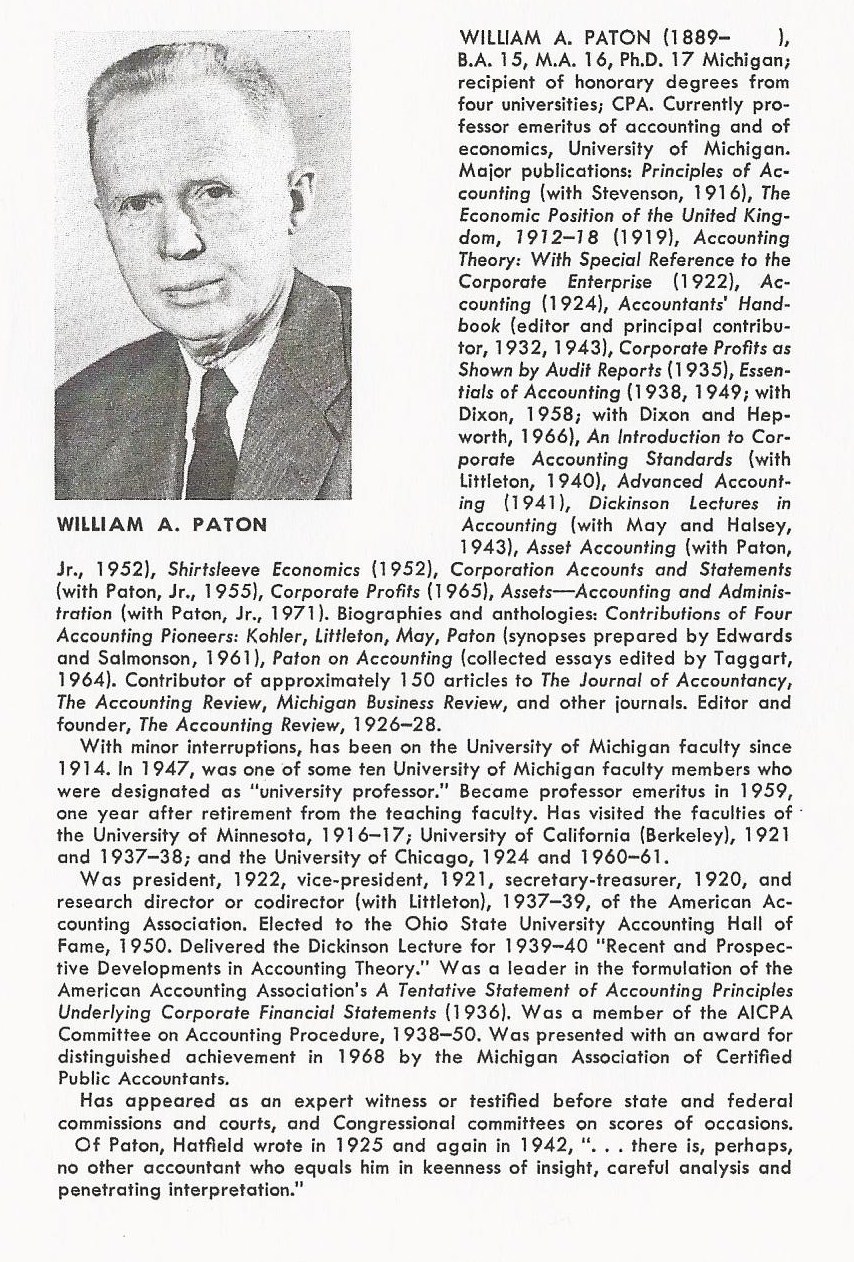
Aulana Louise Peters (1941-)
James Loring Peirce (1907-1994)
Coffman, E. N. and D. L. Jensen. 1997. James L. Peirce Collection of Writings: Thomas J. Burns Series in Accounting History Accounting Hall of Fame. OSU Acctg Hall of Fame.
Stephen H. Penman (?-
Accounting Education News. 2019. 47(1): 6. "Stephen H. Penman is the George O. May Professor and Chair of the Accounting Division in the Graduate School of Business, Columbia University, where he is also the co-director of the Center for Excellence in Accounting and Security Analysis, and director of the master’s program in Accounting and Fundamental Analysis. His research examines the valuation of equity and the role of accounting information in security analysis, and a number of his papers focus on accounting policy issues. He has published widely in finance and accounting journals and conducted seminars on accounting and analysis for academic and professional audiences. This work has been recognized with several awards including the AAA/AICPA Notable Contribution to Accounting Literature Award (1991). In 2002, he was awarded the Deloitte Foundation Wildman Medal Award for his book, Financial Statement Analysis and Security Valuation."
Donald Putnam Perry (1895-1957)
Coffman, E. N. and D. L. Jensen. 2004. Donald P. Perry: A collection of His Writings: Thomas J. Burns Series in Accounting History Accounting Hall of Fame. Ohio State University.
Gary John Previts (1942-)
John William Queenan (1906-1995)
Howard Irwin Ross (1907-1974)
Thomas Henry Sanders (1885-1953)
Walter Paul Schuetze (1932-2017)
Hiram Thompson Scovill (1885-1962)
Katherine Schipper (?-
Leslie French Seidman (?-
Accounting Education News, Winter 2020 Issue. Leslie French Seidman is an independent director for General Electric and Moody’s corporations where she serves as the chair of the Audit Committee (for both companies), as well as serving on other committees. She was the founding director of the Center for Excellence in Financial Reporting at the Lubin School of Business at Pace University and serves as an advisor to Idaciti, a digital reporting company. Seidman is a past chairman of the Financial Accounting Standards Board (FASB), where she also served as a member of the board (2003-2013). She is also a past member of the board of the Financial Industry Regulatory Authority and Financial Executives International. Previously, Seidman was an auditor with Arthur Young & Co., a Vice President of Accounting Policy with J.P. Morgan & Co., and a member of the FASB staff. She has received numerous awards, including the Distinguished Service Award from the Institute of Management Accountants, for launching the innovative Women’s Accounting Leadership program. Seidman has been ranked among the Top 10 Most Influential People in Accounting by Accounting Today and was named to the NACD Directorship 100 for Governance. Ms. Seidman authored the first three editions of Financial Instruments: A Comprehensive Guide to Accounting and Reporting (currently in its 19th edition from Wolters Kluwer). Seidman graduated from Colgate University in 1984 with a degree in English and earned a master’s degree in accounting from New York University. She is a CPA and is certified in cybersecurity oversight.
Elijah Watt Sells (1858-1924)
Richardson, A. P. and J. E. Sterret. 1924. Elijah Watt Sells. Journal of Accountancy (April): 275.
Ross Macgregor Skinner (1923-2003)
Rutherford, R. T., D. L. Jensen and R. M. Skinner. 2001. Accounting Hall of Fame 2000 induction: Remarks, citation, and response: Ross M. Skinner. The Accounting Historians Journal 28(1): 146-156.
David Solomons (1912-1995)
Zeff, S. A., T. J. Burns and D. Solomons. 1993. 1992 Accounting Hall of Fame induction: David Solomons. The Accounting Historians Journal 20(1): 103-115.
Parker, R. H. 1995. David Solomons and British Accounting. Accounting and British Research (25): 311-319. Reprinted in Parker, R. H., S. A. Zeff and M. Anderson. 2012. Major Contributions To The British Accountancy Profession: A biographical sourcebook. The Institute of Charted Accountants of Scotland, 118-121.
Leonard Paul Spacek (1907-2000)
Zeff, S. A. 1987. Leaders of the accounting profession: 14 who made a difference. Journal of Accountancy (May): 46-71. (Robert H. Montgomery, George O. May, William A. Paton, Carman G. Blough, Andrew Barr, Samuel J. Broad, John L. Carey, Paul Grady, Eric L. Kohler, A. C. Littleton, Weldon Powell, Leonard Spacek, Charles E. Sprague, and William W. Werntz).
The following biography was written by Steve Zeff and appeared in Keller, T. F. and S. A. Zeff. editors. 1969. Financial Accounting Theory II: Issues and Controversies. McGraw Hill, p. 135.
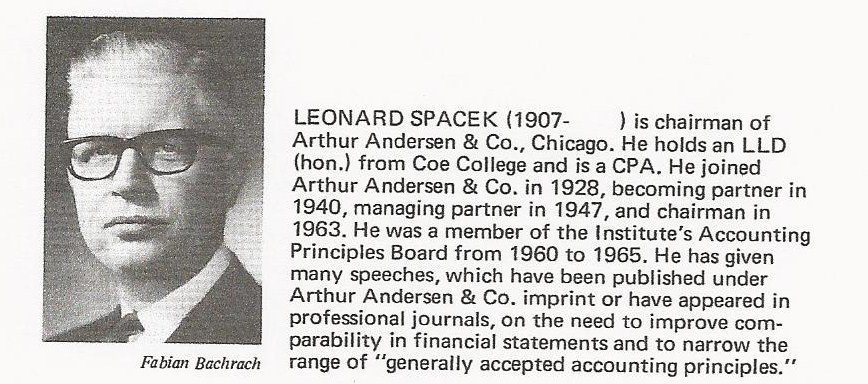
Charles Ezra Sprague (1842-1912)
Sprague, C. E. 1972. The Philosophy of Accounts. Scholars Book Co. Reprint of the 1908 edition. Review by G. J. Previts. 1974. TAR (January): 216-217.
Zeff, S. A. 1987. Leaders of the accounting profession: 14 who made a difference. Journal of Accountancy (May): 46-71. (Robert H. Montgomery, George O. May, William A. Paton, Carman G. Blough, Andrew Barr, Samuel J. Broad, John L. Carey, Paul Grady, Eric L. Kohler, A. C. Littleton, Weldon Powell, Leonard Spacek, Charles E. Sprague, and William W. Werntz).
Robert Thomas Sprouse (1922-2007)
Horngren, C. T., T. J. Burns and R. T. Sprouse. 1994. 1994 Accounting Hall of Fame induction: Robert Sprouse. The Accounting Historians Journal 21(2): 151-161.
Swieringa, R. 2011. Robert T. Sprouse and fundamental concepts of financial accounting. Accounting Horizons (March): 207-220.
The following biography was written by Steve Zeff and appeared in Zeff, S. A. and T. F. Keller, editors. 1973. Financial Accounting Theory I: Issues and Controversies, Second edition. McGraw Hill, p. 164.
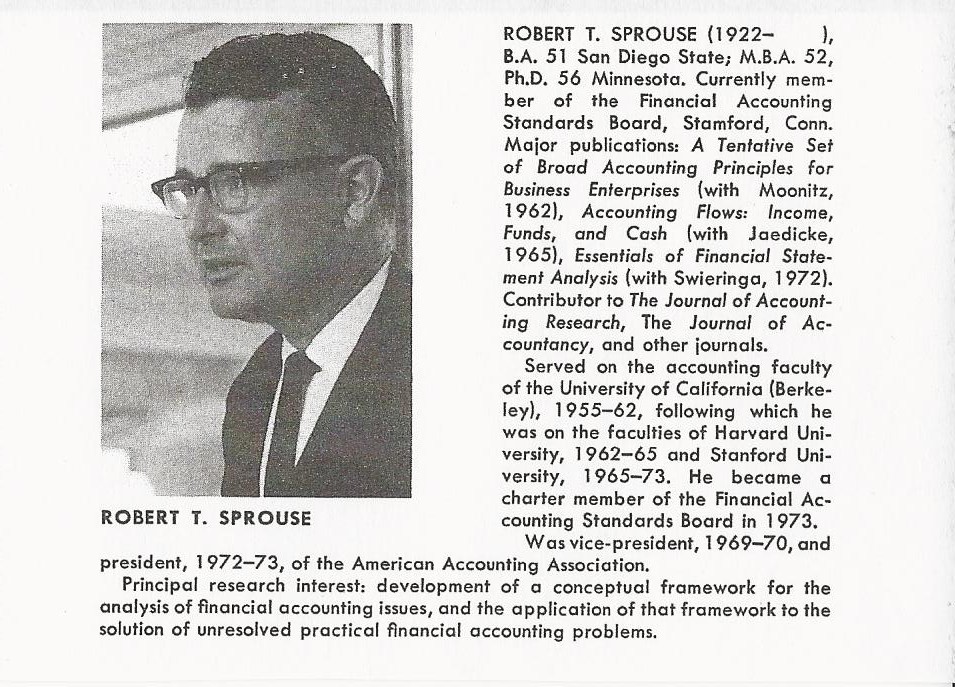
Elmer Boyd Staats (1914-2011)
Maurice H. Stans (1908-1998)
Smith, G. S. 2007. Maurice Stans' view of social responsibility in the accounting profession. The Accounting Historians Journal 34(1): 147-172.
Victor Herman Stempf (1893-1946)
Robert Raymond Sterling (1931-2010)
Wolnizer, P. W. 2010. Tribute to Robert Raymond Sterling. Abacus 46(3): 229-231.
Lee, T. A. and P. W. Wolnizer. 2012. An intellectual memorial to Robert Raymond Sterling, accounting reformer. Accounting Horizons (March): 135-146.
The following biography was written by Steve Zeff and appeared in Zeff, S. A. and T. F. Keller, editors. 1973. Financial Accounting Theory I: Issues and Controversies, Second edition. McGraw Hill, p. 520.
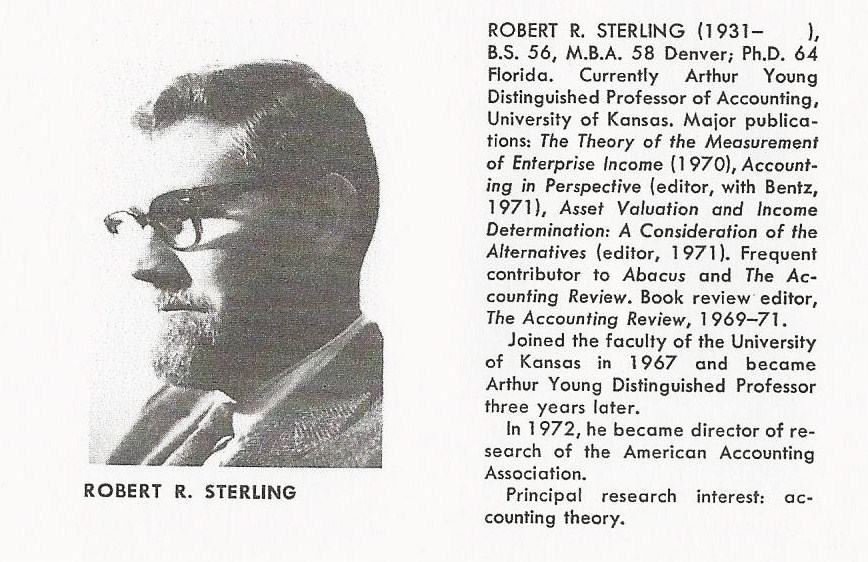
Joseph Edmund Sterrett (1870-1934)
Merino, B. D. 1975. Joseph E. Sterrett (1870-1934). The Accounting Historians Journal 2(1-4): 62-64.
Reed K. Storey (1926-1999)
The following biography was written by Steve Zeff and appeared in Zeff, S. A. and T. F. Keller, editors. 1973. Financial Accounting Theory I: Issues and Controversies, Second edition. McGraw Hill, p. 150.
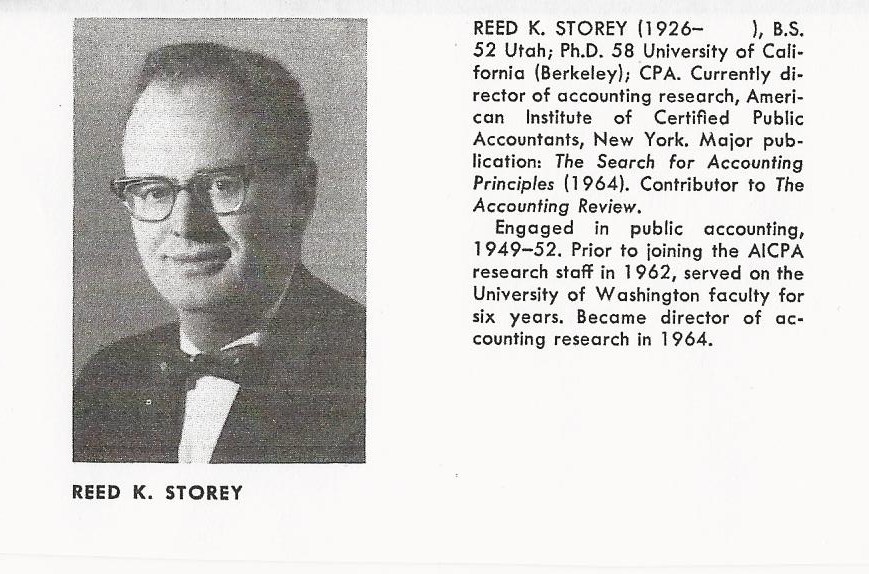
Kenneth Wilson Stringer (1918-2014)
AAA 2018. "Kenneth Wilson Stringer (1918-2014) spent his public accounting career with Deloitte and its predecessor firm, Haskins & Sells, advancing the processes supporting statistical sampling in auditing and analytical review. He served as Chair of the AICPA Statistical Sampling Committee during the years 1960-64, and was also a member of that organization’s first committee on Auditing of EDP records. By conducting dedicated working retreats, being a contributor to professional literature and conference presentations, he led and advanced practice, related his knowledge to academics and thus university teaching. While collaborating with others in a variety of disciplines, the major developments in the principles of audit evidence inherent in today’s auditing standards can be traced to his pioneering efforts."
Shyam Sunder (?-
Accounting Education News, Winter 2020 Issue. Shyam Sunder is the James L. Frank Professor of Accounting, Economics, and Finance at the Yale School of Management and Professor (by courtesy) in the Department of Economics. He is a renowned accounting theorist and experimental economist. His research contributions to accounting include financial reporting, information in security markets, statistical theory of valuation, social norms, and regulation. He is a pioneer in the fields of experimental finance and experimental macroeconomics. Sunder’s research includes ten books and more than 220 articles in the leading journals of accounting, economics, and finance, as well as in popular media. His monograph, Theory of Accounting and Control (1997), has been translated into Chinese, Japanese, Korean, Portuguese, and Spanish. He and his research have been awarded multiple honors including the AAA/PricewaterhouseCoopers Foundation Outstanding Accounting Educator Award (2013), the AAA Distinguished International Lecturer (2000), and the AAA Presidential Research Lecturer (1999). He is a two-time recipient of the AAA/AICPA Notable Contributions to Accounting Literature Award (1982, 1998) and a recipient of the Competitive Manuscript Award (1975). He is a past president (2006-2007) and director of research (1988-1990) of the AAA, former director of Yale’s Millstein Center for Corporate Governance and Performance, and fellow of the Whitney Humanities Center, distinguished fellow of the Center for Study of Science and Technology Policy in Bengaluru, and research fellow of the Research Institute of Economics and Business Administration, Kobe University. He is also a member of the International Academic Advisory Boards of the Indian Institute of Technology, Gandhinagar, and the Business School of Jindal Global University, Sonepat, India. He is a founding editor of Accounting, Economics and Law: A Convivium.
Robert Martin Trueblood (1916-1974)
Bryson, R. E. Jr. 1976. Robert M. Trueblood, CPA: The Consummate Professional. Georgia State University.
The following biography was written by Steve Zeff and appeared in Keller, T. F. and S. A. Zeff. editors. 1969. Financial Accounting Theory II: Issues and Controversies. McGraw Hill, p. 28.
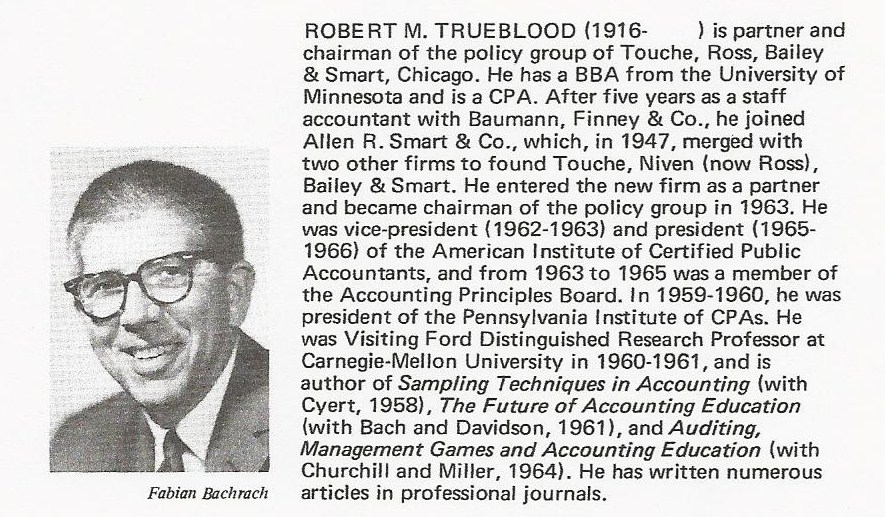
Sir David Philip Tweedie (1944-
William Joseph Vatter (1905-1990)
Moonitz, M. 1991. Memorial:William Joseph Vatter, (1905-1990). The Accounting Review (October): 862-865.
The following biography was written by Steve Zeff and appeared in Keller, T. F. and S. A. Zeff. editors. 1969. Financial Accounting Theory II: Issues and Controversies. McGraw Hill, p. 96.
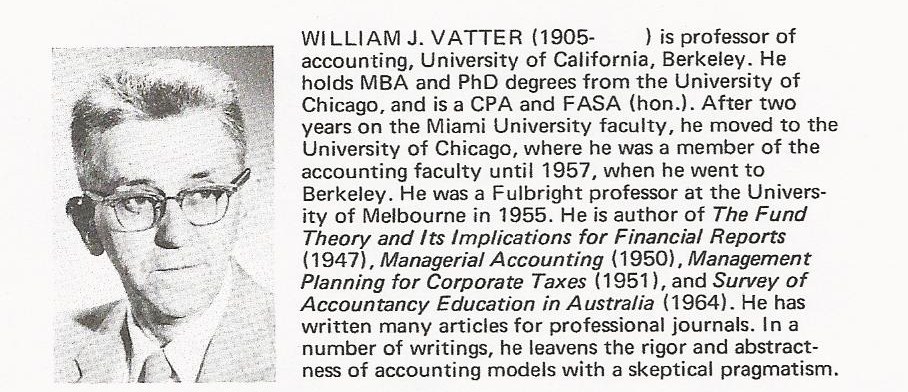
David Michael Walker (?-
William Welling Werntz (1908-1964)
Zeff, S. A. 1987. Leaders of the accounting profession: 14 who made a difference. Journal of Accountancy (May): 46-71. (Robert H. Montgomery, George O. May, William A. Paton, Carman G. Blough, Andrew Barr, Samuel J. Broad, John L. Carey, Paul Grady, Eric L. Kohler, A. C. Littleton, Weldon Powell, Leonard Spacek, Charles E. Sprague, and William W. Werntz).
The following biography was written by Steve Zeff and appeared in Keller, T. F. and S. A. Zeff. editors. 1969. Financial Accounting Theory II: Issues and Controversies. McGraw Hill, p. 43.
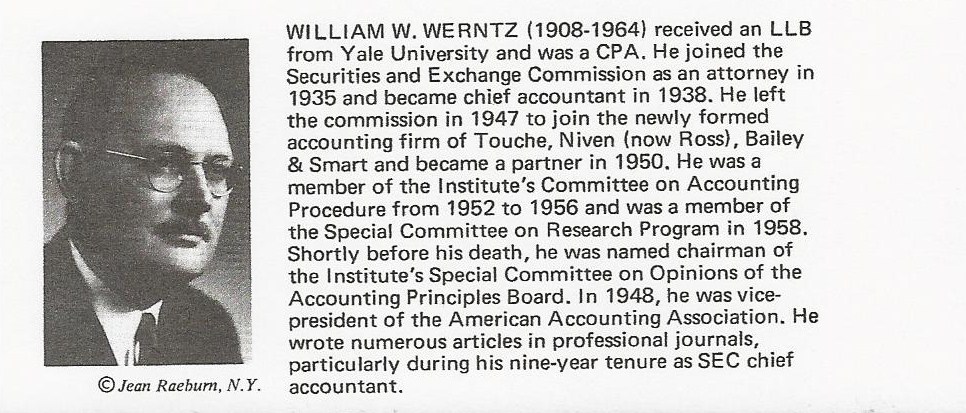
Robert Ernest Verrecchia (1949-)
Doyle Zane Williams (1939-2021)
Doyle Z. Williams (December 18, 1939-September 29, 2021)
Accounting Education News, Fall 2021 Issue. Doyle Z. Williams, 81, of Silver Spring, MD, passed away Wednesday, September 29, 2021. He was born December 18, 1939, in Shreveport, LA to the late Nuell and Lurline Williams as the fourth of five boys and grew up in northwest Natchitoches Parish. He graduated from Ajax High School in 1957 and received his B.S. in Business and Accounting from Northwestern State University in 1960. After working a year in New Orleans, he attended Louisiana State University where he received his M.S and Ph.D. in Accounting. In 1965, he joined the faculty at Texas Tech University. In 1966, he met Maynette Derr when she joined the Home Economics faculty after completing her doctorate at The Ohio State University. They were married August 20, 1967, and went to New York for two years where Doyle worked for the American Institute of Certified Public Accountants and Maynette worked for the headquarters office of J. C. Penney, Inc. They returned to the faculty at Texas Tech where Doyle was named Coordinator for the Area of Accounting in 1973. In 1978, he joined the University of Southern California where he became the founding Dean of the School of Accounting. From 1986-88 he served as Interim Dean of the USC School of Business Administration and served as Chair of the Accounting Education Change Commission from 1989-1993. In 1993, he was named the Dean of the College of Business at the University of Arkansas. In 1998, the College received the largest gift ever to a US business school from the Walton Family Foundation and the college was renamed the Sam M. Walton College of Business. Upon his retirement from the University of Arkansas in 2005, he was named Dean Emeritus of the Walton College of Business and the university endowed a $1.5 million chair in his and Maynette’s name. In 2006, he moved to Canton, Ga., where he served for four years as Senior Scholar at Kennesaw State University. From 2008-12, he served as Executive Director of the Accounting Doctoral Scholars Program for the American Institute of CPAs Foundation. He served as a Deacon in the Redondo Beach, Calif., Presbyterian Church, as a substitute Sunday School Teacher at University Baptist Church in Fayetteville, Ark., and at First Baptist Church in Woodstock, Ga. He was a member of the Lubbock, Texas, and the Los Angeles, Calif., Rotary clubs with a perfect attendance record for 22 years. He believed strongly that members of any profession should give back to their profession through active service. His 192 professional offices and leadership service appointments include serving as President of the American Accounting Association (1984-85), a member of Council and the Board of Directors of the American Institute of CPAS and Chair of the Board for the Assembly to Advance Collegiate Schools of Business (AACSB). During his career he made 288 program appearances and presentations. He visited more than 150 university campuses in the United States and served on accreditation teams or as lecturer at 16 universities outside the USA. His 42 awards and recognitions include the AICPA’s Gold Medal Award, the American Accounting Association’s Outstanding Accounting Educator Award and the Lifetime Service Award, induction into Louisiana State University’s College of Business Hall of Distinction, Texas Tech University’s Lifetime Achievement in Accounting Education Award and the Hall of Distinction from Northwestern State University. In 2012, he was named to the Journal of Accountancy‘s “125 People of Impact in Accounting since 1887.” In October 2020 he was named to The Accounting Hall of Fame by the American Accounting Association. Surviving are his wife of 54 years, Maynette D. Williams; his brother, Dale Williams and wife Nell; son and daughter-in-law, Zane Williams and Michelle Williams; daughter, Elizabeth Williams; three granddaughters, Camille and Claire Williams, and Sydonna Perdew; as well as many other family members, friends and colleagues. Contributions may be made to the University of Arkansas Foundation designated for the Doyle Z. and Maynette D. Williams Endowed Fellowship for a Masters of Accounting Student, the Kennesaw State University Foundation for the endowment of the Doyle Z. Williams Fellowship for a Master’s of Accounting Student, The Louisiana State University Foundation designated for the Doyle Z. Williams Accounting Professorship or the Northwestern State University Foundation for the Doyle Z. Williams Scholarship Fund. (Obituary from https://www.rockettnettles.com/obituary/doyle-williams)
Accounting Education News, Winter 2020 Issue. Doyle Zane Williams is a dean emeritus of the University of Arkansas, where he was dean of the Walton College of Business for twelve years. He served as an initial agent of change in data development related to educational research. His work is documented in the AICPA Education Statistical studies that he developed and were published covering the years 1967-1993. He is a past president of the AAA (1984-1985) and past chair of the Board of Directors of the Association to Advance Collegiate Schools of Business (AACSB) from 2004-2005. His role as chair of the AACSB Board gave him the opportunity to strengthen, expand, and advise institutions as to the elements of accounting accreditation activities. He served as Director of Education of the AAA, president of the Administrators of Accounting Programs, and president of the Federation of Schools of Accountancy. He also served as chair of the Accounting Education Change Commission (AECC) from 1989-1993. The AECC’s statement on the “Objectives of Education for Accountants” was widely quoted and its work served as the basis for many curriculum advances. Working with the Atlanta office of KPMG, he established the Financial Reporting Roundtable involving the 20 largest companies headquartered in Georgia. He was the founding dean of the School of Accounting at the University of Southern California, served as Accounting Area Coordinator at Texas Tech University, and was a senior scholar at Kennesaw State University. He also served as Executive Director of the Accounting Doctoral Scholars Program, administered by the AICPA, from 2008-2012. He received the FSA/Joseph A. Silvoso Faculty Merit Award for distinguished contributions to the Federation, to the profession of accounting, and to accounting education in 1993 and again in 2011. He received the AAA’s Outstanding Accounting Educator Award in 1996. He was the fifth educator to receive the AICPA’s Gold Medal for Distinguished Service in 2002. Upon his retirement from the University of Arkansas, the university established the endowed Doyle Z. and Maynette D. Williams Chair in Professional Accounting.
Gordon Peter Wilson (1946-2020)
Arthur Ramer Wyatt (1927-2017)
Kieso, D. E., J. J. Weygandt, D. L. Jensen and A. R. Wyatt. 1999. Accounting Hall of Fame 1998 induction: Remarks, citation, and response: Arthur Ramer Wyatt. The Accounting Historians Journal 26(1): 153-163.
Stephen Addam Zeff (1933-
Dyckman, T. R. and W. C. Uecker. 2011. A tribute to Professor Stephen A. Zeff. Accounting Education: An International Journal 20(1): 81-95.
The following biography was written by Steve Zeff and appeared in Zeff, S. A. and T. F. Keller, editors. 1973. Financial Accounting Theory I: Issues and Controversies, Second edition. McGraw Hill, p. 2.
